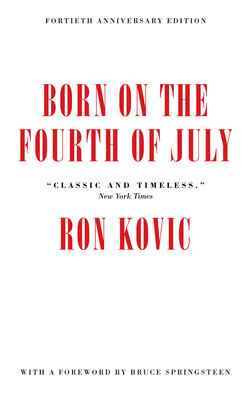Читать книгу Born on the Fourth of July - Ron Kovic - Страница 12
На сайте Литреса книга снята с продажи.
Оглавление2
THE BUS TURNED off a side street and onto the parkway, then into Queens where the hospital was. For the first time on the whole trip everyone was laughing and joking. He felt himself begin to wake up out of the nightmare. This whole area was home to him—the streets, the parkway, he knew them like the back of his hand. The air was fresh and cold and the bus rocked back and forth. “This bus sucks!” yelled a kid. “Can’t you guys do any better than this? I want my mother, I want my mother.”
The pain twisted into his back, but he laughed with the rest of them—the warriors, the wounded, entering the gates of St. Albans Naval Hospital. The guard waved them in and the bus stopped. He was the last of the men to be taken off the bus. They had to carry him off. He got the impression that he was quite an oddity in his steel frame, crammed inside it like a flattened pancake.
They put him on the neuro ward. It was sterile and quiet. I’m with the vegetables again, he thought. It took a long while to get hold of a nurse. He told her that if they didn’t get the top of the frame off his back he would start screaming. They took it off him and moved him back downstairs to another ward. This was a ward for men with open wounds. They put him there because of his heel, which had been all smashed by the first bullet, the back of it blown completely out.
He was now in Ward I-C with fifty other men who had all been recently wounded in the war—twenty-year-old blind men and amputees, men without intestines, men who limped, men who were in wheelchairs, men in pain. He noticed they all had strange smiles on their faces and he had one too, he thought. They were men who had played with death and cheated it at a very young age.
He lay back in his bed and watched everything happen all around him. He went to therapy every day and worked very hard lifting weights. He had to build up the top of his body if he was ever going to walk again. In Da Nang the doctors had told him to get used to the idea that he would have to sit in a wheelchair for the rest of his life. He had accepted it, but more and more he was dreaming and thinking about walking. He prayed every night after the visitors left. He closed his eyes and dreamed of being on his feet again.
Sometimes the American Legion group from his town came in to see him, the men and their wives and their pretty daughters. They would all surround him in his bed. It would seem to him that he was always having to cheer them up more than they were cheering him. They told him he was a hero and that all of Massapequa was proud of him. One time the commander stood up and said they were even thinking of naming a street after him. But the guy’s wife was embarrassed and made her husband shut up. She told him the commander was kidding—he tended to get carried away after a couple of beers.
After he had been in the hospital a couple of weeks, a man appeared one morning and handed him a large envelope. He waited until the man had gone to open it up. Inside was a citation and a medal for Conspicuous Service to the State of New York. The citation was signed by Governor Rockefeller. He stuck the envelope and all the stuff in it under his pillow.
* * *
None of the men on the wards were civilian yet, so they had reveille at six o’clock in the morning. All the wounded who could get on their feet were made to stand in front of their beds while a roll call was taken. After roll call they all had to make their beds and do a general clean-up of the entire ward—everything from scrubbing the floors to cleaning the windows. Even the amputees had to do it. No one ever bothered him, though. He usually slept through the whole thing.
Later it would be time for medication, and afterward one of the corpsmen would put him in a wheelchair and push him to the shower room. The corpsman would leave him alone for about five minutes, then pick his body up, putting him on a wooden bench, his legs dangling, his toes barely touching the floor. He would sit in the shower like that every morning watching his legs become smaller and smaller, until after a month the muscle tone had all but disappeared. With despair and frustration he watched his once strong twenty-one-year-old body become crippled and disfigured. He was just beginning to understand the nature of his wound. He knew now it was the worst he could have received without dying or becoming a vegetable.
More and more he thought about what a priest had said to him in Da Nang: “Your fight is just beginning. Sometimes no one will want to hear what you’re going through. You are going to have to learn to carry a great burden and most of your learning will be done alone. Don’t feel frightened when they leave you. I’m sure you will come through it all okay.”
